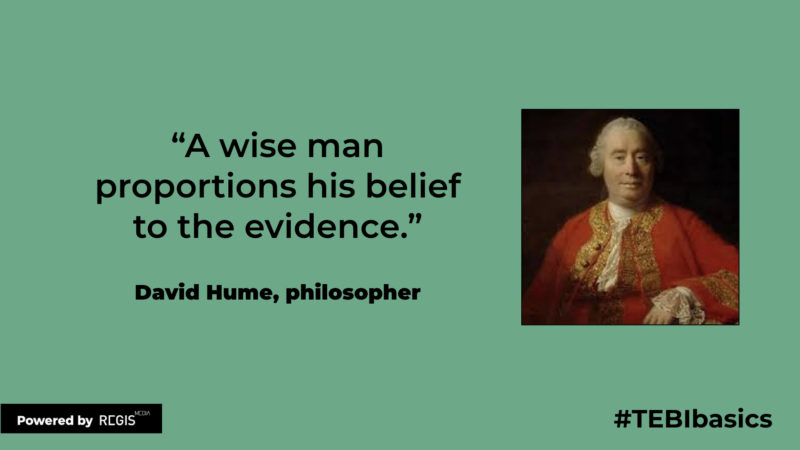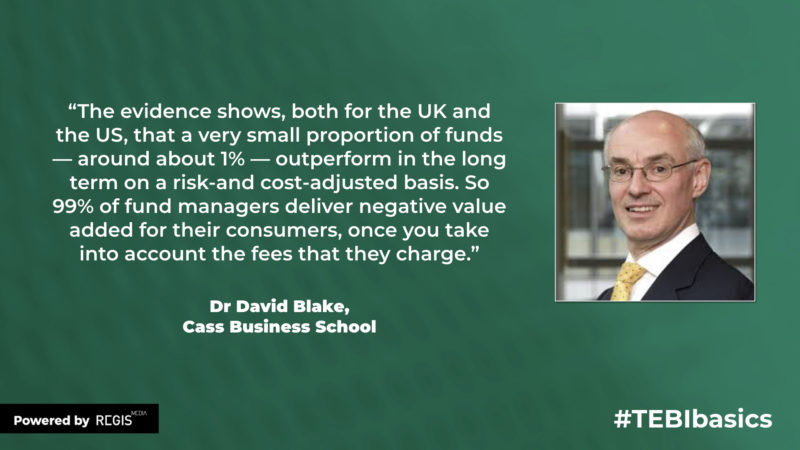
This week on TEBI is Back to Basics Week. Why? Because getting back to the basics is precisely what most investors need to do.
There is never any shortage of people who are only too happy to give you an opinion about investing. The truth is, though, that many of those we look to for guidance and advice usually have their own agendas. What they suggest you do might not be — in fact almost certainly isn’t — what you actually should be doing. That’s just the way it is.
In this series of five articles, we’re going to explain the basics of what we call evidence-based investing.
Please note, before we start, that these articles are for educational purposes only and should not be construed as investment advice. Before making any important decisions regarding your financial future, we recommend that you consult a fiduciary adviser with an evidence-based investment philosophy.
The background
The financial services industry is full of people making promises they can’t keep – promises about ‘beating the market’, about picking the best stocks, about market timing and about guaranteed returns.
Much as these offers can be tempting for those of us looking to grow our wealth and adequately fund our retirement, they don’t really stand up to scrutiny.
The truth is markets are hard to beat consistently. Picking stocks on the view that prices are wrong is like betting on the horses. It can go either way. Not even the professionals are much good at market timing. And as for guarantees, think about this: If there were no risk in investing, why would there be a return?
This blog looks at an investment approach based on evidence, one that is grounded in empirical research and the long-term observation of markets and how they work. This is not an approach based on guesswork or gut feeling or hunches or the idea that any single person has some magic formula for seeing into the future. It’s an approach based on verifiable facts and observation.
In a world of slick marketing, spin and hype, the idea of respecting evidence is frequently undervalued. As the great Scottish philosopher David Hume once said, a wise man proportions his belief to the evidence. The danger of doing otherwise was highlighted by the fictional detective Sherlock Holmes, who said if you theorise before you have the data, you begin to twist facts to suit your theories.
The truth, supported by overwhelming evidence, is that consistently beating the market over the long term is extremely hard. Winning fund managers don’t tend to repeat year-to-year, and even the very few that do tend to capture any additional returns for themselves by charging high fees for their superior skills.

The detail
So why are markets so hard to beat consistently?
Competition: Security prices in global markets represent the aggregated wisdom of millions of buyers and sellers, each with their own views of the right price for each stock. New information, like earnings reports or economic data, are baked into prices instantaneously. The ever-increasing speed of information flows and sophistication of trading systems mean getting an edge is tough. And doing this consistently, day after day, is nigh on impossible. Of course, there may be mistakes in prices. But can you pick them, not just today, but every time? Doubtful.
Arithmetic: If one investor has a strong feeling about an individual stock being mispriced and profits from buying it, there must be a loser on the other side of the trade. One conventional investor can only win at the expense of another. So investing this way, by trying to outguess the market, becomes a zero-sum game.
Cost: Making big bets against the market doesn’t come cheaply. There’s the cost of all that research on individual stocks, the cost of trading, the cost of falling in love with individual stocks or sectors and paying too much for them. Most of all there’s the cost of paying the big salaries and bonuses that the managers demand. So just beating the market isn’t enough. You must beat it by a big enough margin to cover your costs. And you must do it over and over. This means for the end investor, using these traditional funds ends up being even less than a zero-sum game.
News: Even if your view on a stock’s inherent price is rock solid based on today’s information, what if the news changes tomorrow? A company’s advantage might be undone by new technology (think Kodak) or a disaster (think BP) or a governance crisis (think VW). Predicting prices correctly implies you can predict tomorrow’s news headlines. Do you know anyone who can do that?
The evidence
There are dozens of studies illustrating the difficulty money managers have in outperforming the market consistently:
— Professor David Blake at Cass Business School in London has led an on-going study into the performance of equity funds in Britain and the US. It found that very few funds beat the market over the long term on a risk- and cost-adjusted basis, and that even those funds effectively claw back from investors any additional returns they generate by charging higher fees.
— Professor Eugene Fama (a 2013 Nobel laureate) and his research partner Kenneth French studied the performance of more than three thousand US mutual funds over 22 years. They found that on average the funds lagged the market by about the fees they charged. While some individual managers undoubtedly did outperform, it was almost impossible to discern whether this was due to skill or luck.
— S&P Dow Jones Indices regularly publishes a report (Standard & Poor’s Index Versus Active or ‘SPIVA’) which compares the returns of traditional managers against indexes across different time periods and asset classes in various markets around the world. The overwhelming pattern is that actively managed funds tend to underperform their benchmarks over short and long periods and funds that do outperform over some periods do not do so over others.

Next time: Growing your wealth
Looking for a financial planner with an evidence-based investment philosophy? We may be able to help you. Click here for more details.
This content, and indeed all of the content you will find on The Evidence-Based Investor, is for informational, entertainment or educational purposes only and should not be construed as investment advice. While the information provided is believed to be accurate, it may include errors or inaccuracies.
COPYRIGHT
Regis Media owns the copyright to all of TEBI’s content, and republishing any of it without permission is strictly prohibited. We will take appropriate action in the event of any infringements.
Financial advisers may wish to note that we allow selected firms to use our investor education content under licence, and that we also produce original and customised articles and videos. Visit our website for further information.









